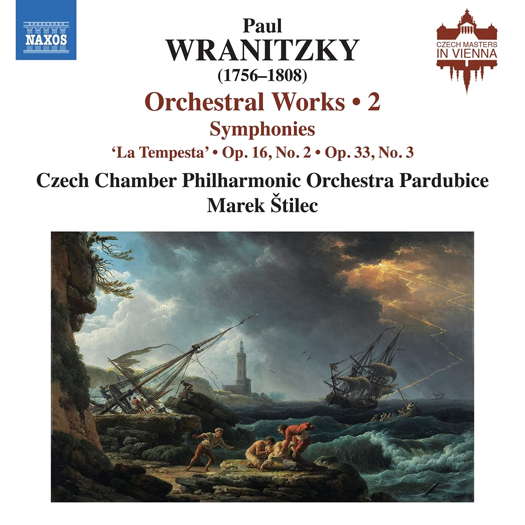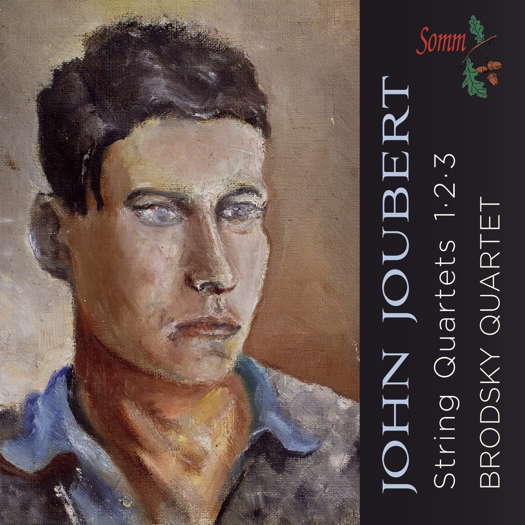 SPONSORED: A Seasoned Champion of New Music. Argentinian-American pianist Mirian Conti in conversation with Andrew Schartmann.
SPONSORED: A Seasoned Champion of New Music. Argentinian-American pianist Mirian Conti in conversation with Andrew Schartmann.
All sponsored features >>

A Prolific Composer
Orchestral music by Czech composer Paul Wranitzky, warmly recommended by GERALD FENECH
'Marek Štilec makes a strong case for these works and his expansive approach brings out all the charm and richness of Wranitzky's scoring.'
Paul Wranitzky was born in Neureisch in Habsburg Moravia. He studied theology at the University of Olomouc and later at a seminary in Vienna. When he was twenty, like so many Czech composers of that period, he moved to Vienna to seek out more favourable opportunities in the Austrian capital. From 1790 he conducted both royal theatre orchestras, and his natural talents commanded the respect of such immortal greats as Mozart, Haydn and Beethoven. Indeed, the latter two preferred him as conductor of their new works; Beethoven's First Symphony was such an occasion. Wranitzky was a prolific composer and his output comprises forty four symphonies, at least fifty six string quartets - some sources give the number as high as seventy three - and a large amount of other orchestral and chamber music. His opera Oberon, the Fairy King from 1789 was a favourite with opera lovers of the time, and the piece inspired Emanuel Schikaneder to write the libretto of The Magic Flute for Mozart in 1791. In the mid 1790s Goethe tried to collaborate with Wranitzky on a sequel to the Mozart masterpiece, but this project never materialized.
Today this exciting composer is identified as being one of three possible individuals said to have composed the Austrian national anthem, but the enigma remains, as the identity of the actual composer is not definitely known. Wranitzky was an exact contemporary of Mozart, so it is no surprise that their admiration was mutual. They were also members of the same masonic lodge, and this resemblance sometimes led observers to state that Wranitzky was, in certain genres, better than Mozart. The composer died in Vienna on 29 September 1808, following which, as a homage, Beethoven wrote the Variations on a Russian Dance based on a theme from Wranitzky's ballet The Forest Maiden.
The works on this superb volume in this cycle includes three contrasting symphonies, and the overture Der Schreiner (The Carpenter) from a one-act opera composed in 1799. Premiered on 18 July of that same year in Vienna, the piece relates the adventures of Simon, the titular carpenter, who is fitting new windows at the home of Frau von Stenwald, a rich widow. Intercepting a delivery of his wife's famous doughnuts to the local doctor, Simon is shocked to discover she has baked love notes into the sweets. The widow is furious, as she and the doctor are to be married. Drama ensues.
The music in the overture captures the mood of the situation with uncanny imagery and some energetic passages that culminate with an extensive coda, featuring an attractive exchange of running scales. The music also depicts the sounds of hammering, planing and sawing.
Listen — Wranitzky: Overture Der Schreiner
(track 1, 0:46-1:41) ℗ 2021 Naxos Rights (Europe) Ltd :
The Symphony in D minor La Tempesta only survives in manuscript copies, and dates before 1795. In three movements, the piece includes a lively Vivace, a generally quiet Adagio that represents a pastorally serene atmosphere, and a final Allegro con fuoco full of tremolos, sudden accents, dissonances and diminished chords all layered in different combinations to create the impression of nature's violence.
Listen — Wranitzky: Finale La Tempesta (Symphony in D minor)
(track 4, 0:12-1:09) ℗ 2021 Naxos Rights (Europe) Ltd :
The set of three symphonies, Op 16, was published in 1792. However, the one in A, Op 16 No 2, is decidedly less grand than its two companions. The orchestral forces and compositional style hint that this is an earlier work, brought into publishing by the increasing demand for Wrantizky's works. Stylistically, one can place it within the composer's early symphonic period of the mid-1780s.
Listen — Wranitzky: Adagio (Symphony in A, Op 16 No 2)
(track 6, 0:00-0:58) ℗ 2021 Naxos Rights (Europe) Ltd :
The Symphony in F, Op 33 No 3, is also one of a set of three. Published in 1798, it is dedicated to Baron Peter von Braun, manager of the Viennese court theatres. Filled with catchy themes and some really imaginative scoring, this piece is a pure delight from start to finish. A rousing coda aptly concludes a symphony that is a celebration of the joys of life.
Listen — Wranitzky: Allegro assai (Symphony in F, Op 33 No 3)
(track 12, 4:04-4:59) ℗ 2021 Naxos Rights (Europe) Ltd :
Maybe not as close to Mozart's as one is led to believe, but all the same, this is splendid music, ingenious, incisive, vibrant, melodious and, above all, superbly crafted within a framework of harmonic boldness. Marek Štilec makes a strong case for these works and his expansive approach brings out all the charm and richness of Wranitzky's scoring. Warmly recommended.
Copyright © 12 July 2021
Gerald Fenech,
Gzira, Malta

CD INFORMATION - PAUL WRANITZKY: ORCHESTRAL WORKS 2
GERALD'S REVIEW OF PAUL WRANITZKY: ORCHESTRAL WORKS 1
MORE CLASSICAL MUSIC ARTICLES ABOUT THE CZECH REPUBLIC



